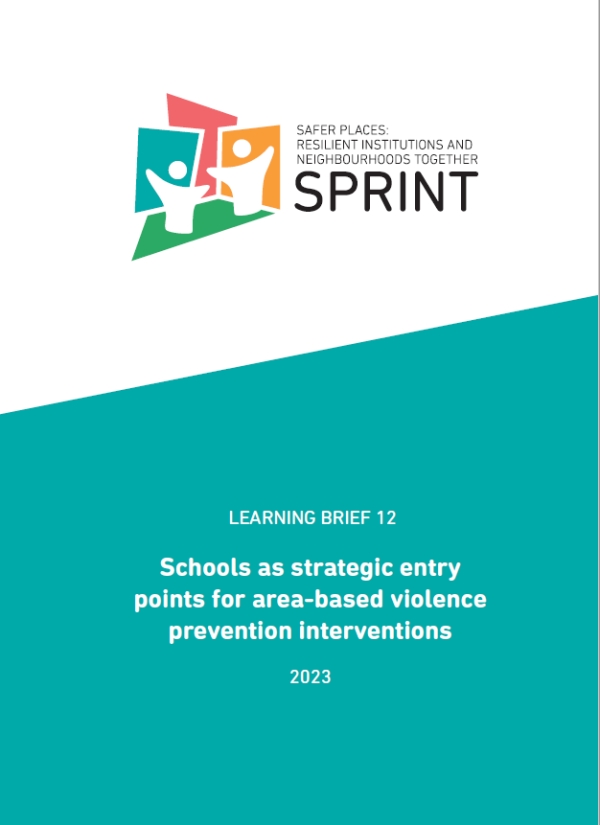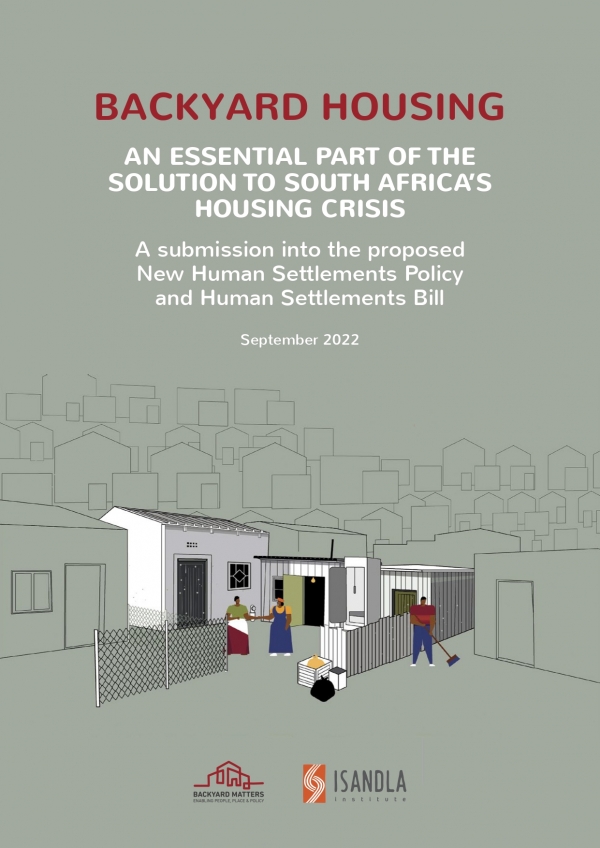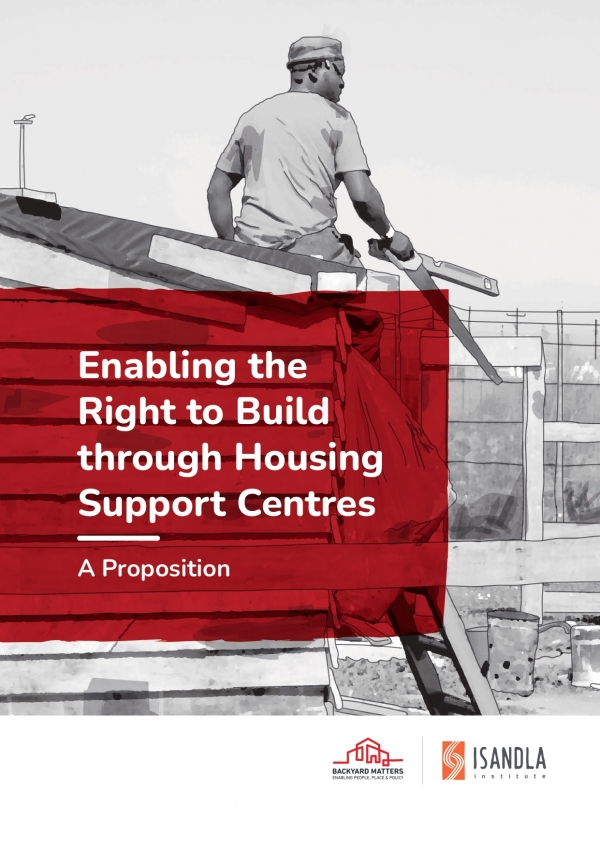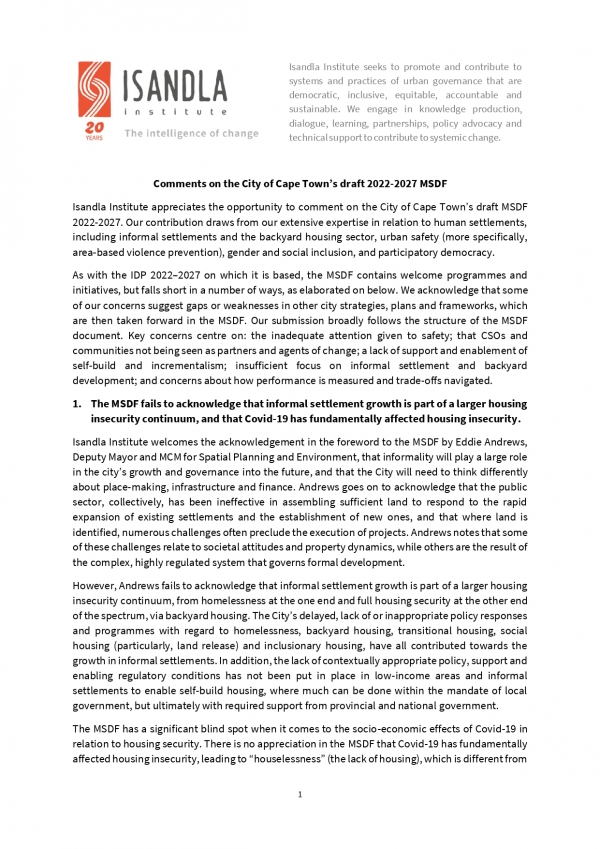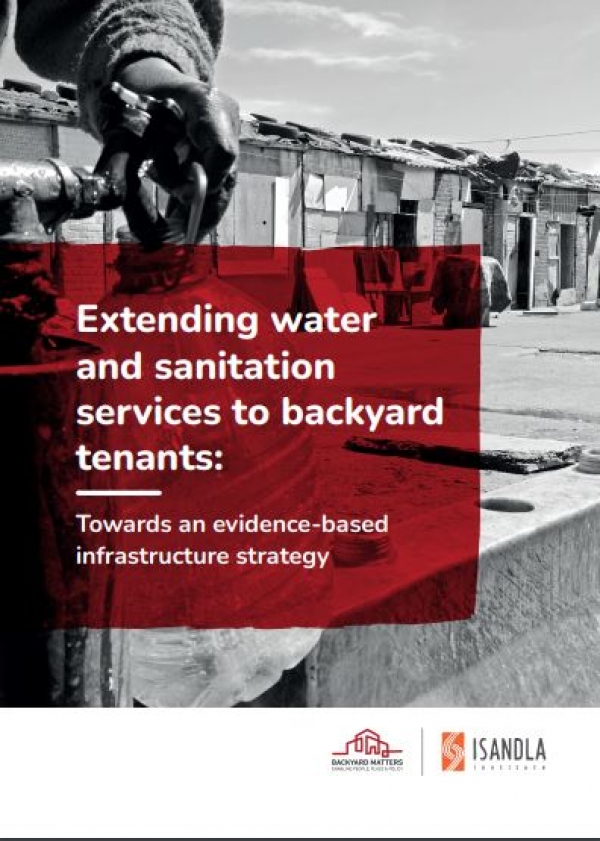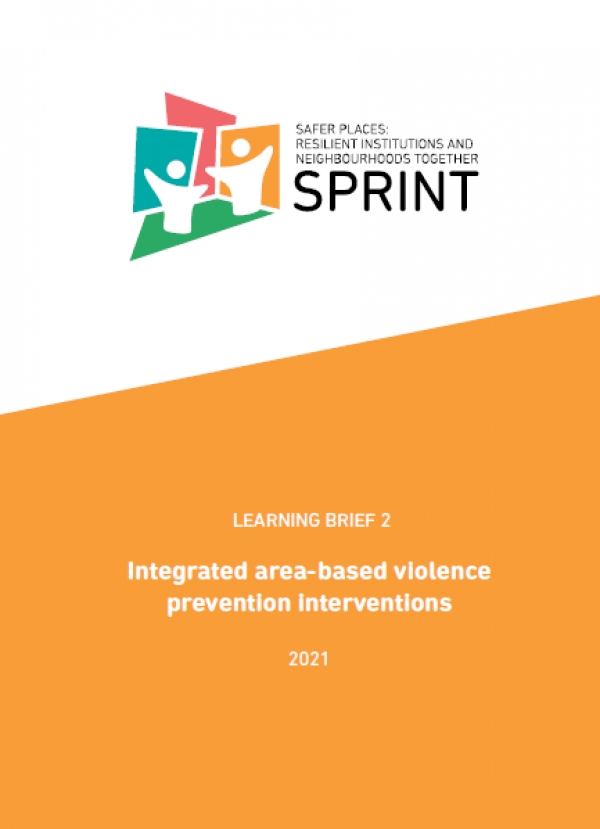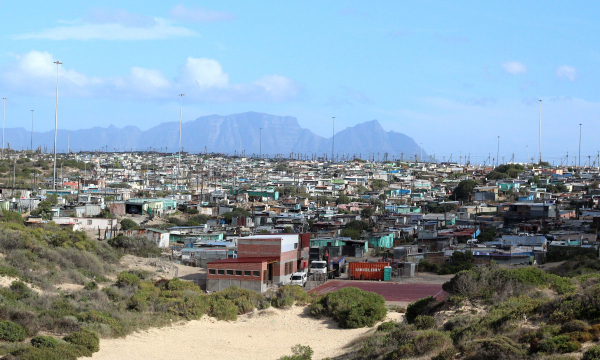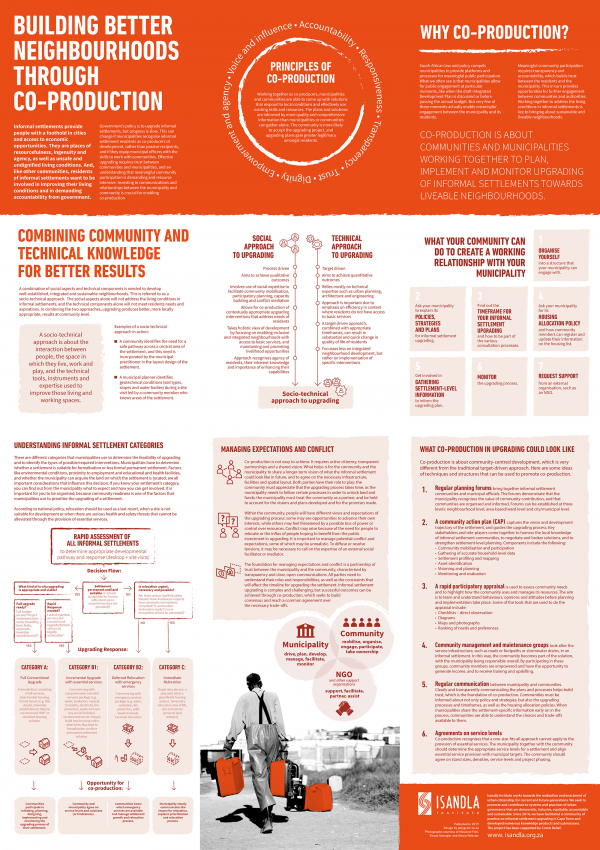News
Isandla Institute has noted Minister Sisulu’s address pertaining to the Human Settlements Budget Vote (33) on 18 May 2021. As an organisation advocating for and contributing towards systems and practices of urban governance that are democratic, inclusive, equitable, accountable and sustainable, we are particularly concerned about spatial transformation of South Africa’s cities and towns.
We welcome the substantial increase in funding for informal settlement upgrading. This is a significant development, and demonstrates recognition that urbanisation is inevitable and that informal settlements are here to stay. This demonstrates a clear break with earlier the approach attempting to ‘eradicate’ informal settlements and we welcome the more pragmatic stance taken by the Department of Human Settlements that focuses on improving the lives of people who live in informal settlements, both now and in the future.
However, there are still questions about how the process of upgrading will play out in reality. The budget positions the newly introduced Informal Settlements Upgrading Partnership Grant (ISUPG) as the key funding mechanism through which upgrading will take place, but little information is publicly available about how the grant will function. For instance, there has been no official communication about the conditionalities attached to the grant, which makes it difficult to understand exactly how it will be used by provinces and metropolitan municipalities.
Another concern, and one that is often raised in relation to government target setting, is that there is no evidence that the informal settlement upgrading targets contained in the budget are evidence-based. There are legitimate doubts about whether the targets are based on meaningful engagement with municipalities and provinces, and whether an analysis of the actual costs associated with upgrading specific settlements has taken place. Setting realistic targets that are based on sound evidence is important both for achieving outcomes and for accurately and appropriately measuring government performance.
Thirdly, and importantly, there is a sustained risk of equating informal settlement upgrading to ‘the provision of serviced sites’, a slippage even evident in the Minister’s speech. Yet, the policy on informal settlement upgrading is much more encompassing and includes planning for, and investing in, functional and dignified neighbourhoods – by providing social and economic amenities as well. This certainly brings into question what specifically the new grant will be used for and what measurements of informal settlement upgrading the Department (and other spheres of government) will use.
While much-needed emphasis has been placed on informal settlement upgrading, there is no mention of the informal backyard rental sector in either the budget vote or budget speech. This is worrying, especially considering that this is a rapidly growing housing sector that accommodates an increasing number of people year on year. Not only is it growing substantially, but it is also an increasingly insecure sector because of the impact of COVID-19 and the associated lockdowns. The increased financial pressure faced by many households living in backyard accommodation is directly related to the increase in land occupations across South Africa’s metropolitan municipalities. Occupations will increase and a growing number of people will face housing insecurity if the informal backyard housing sector does not get the attention and resources that it deserves, so it is disappointing to see that the sector is not mentioned explicitly in the budget.
We would have liked the Minister to have addressed the issue of ‘affordable housing’, and in particular offer a more nuanced perspective on the broad household income band of R3,501 - R22,000 that is being targeted by the Human Settlements Development Bank. We believe that this income band should be more clearly segmented to ensure that public money is spent on those who need it most. Many private developers are already catering to the R18,000 - R22,000 income market, which brings into question whether scarce public resources should be invested here - especially when the scale of our housing crisis is so large.
Finally, we expected Minister Sisulu to confirm that a new Human Settlements White Paper will be out for consultation this year. The White Paper has been forthcoming for several years, and will play an important role in clarifying how the various human settlements programmes will fit together to achieve socio-economic inclusion and spatial justice. The omission of the White Paper from the budget speech is curious, and we would like to understand why such an important policy document was not mentioned.
Isandla Institute remains committed to ensuring that all urban citizens have access to opportunities and resources that support dignity, agency and equality.
? 021 683 7903
Sep
Centring the local economy and livelihoods in informal settlement upgrading
Informal settlements represent the failure of South Africa’s labour market. A just urban transition places significant emphasis on economic considerations as central to climate-informed development. Place-based, place-making and circular economy approaches hold significant potential for foregrounding the economic dimensions and potential of informal settlement upgrading, with public employment programmes playing a critical role in the transformation of informal settlements.
Sep
Informal settlements as catalysts for a just urban transition
The persistent presence and growth of informal settlements should be understood as a national crisis, requiring extraordinary measures and targeted investment. Using a just urban transition frame, this crisis can become a vital opportunity, not only for informal settlement residents but also for the urban systems that these settlements are part of.
Mar
Mapping the small scale affordable rental housing sector
The small-scale affordable rental housing sector is highly diverse. Awareness of crucial differences is important for understanding the varied ways in which they operate and their future growth potential and capacity to formalise. It is also key to developing appropriate responses and support interventions that adequately respond to the needs and opportunities inherent to specific sub-sectors of this housing market.
Dec
(Re)Introducing Isandla Institute
Throughout our organisational history, Isandla Institute has sought to promote and contribute to systems and practices of urban governance that advance spatial justice, urban inclusion, active citizenship and equitable urban development. As we chart our trajectory for the next phase, our work will be guided by the notion of a just urban transition. Read more about our programmes.
Oct
Sustainable homes: Alternative building technologies for low-carbon affordable housing construction
Many people live in unsafe informal structures which disproportionately expose them to climate change impacts, while the construction sector is among the largest emitters of greenhouse gases. This paper looks at how ABTs can be a game changer for affordable housing that is safe, dignified, climate-resilient and potentially low-carbon, and their great potential for job creation.
Sep
Backyarding: Energy poverty and the shift to renewable energy
Many South African households experience some form of energy poverty or live in a perpetual state of energy poverty. This practice brief examines the many drivers and impacts of energy poverty and relates these to some of the opportunities and challenges presented by South Africa’s just energy transition - aimed at improving access to clean, renewable and sustainable energy sources for everyone.
Aug
Summary Report CSO Winter School
The CSO Winter School on Backyard Housing took place on 11-13 June 2024. The Winter School provided dedicated space for CSOs to engage some of the crucial challenges and opportunities confronting the backyard housing sector. Insightful presentations and engaging discussions allowed for reflection on a range of issues that not only impact the backyard housing sector but are commonly confronted by all communities who live in conditions of informality.
The core objectives of the CSO Winter School were to:
• Deepen knowledge of the (diverse) backyard housing sector and the important role it plays in providing affordable housing and facilitating and contributing to local economic and neighbourhood development;
• Increase understanding of the challenges faced by the sector and the potential role(s) that CSOs could fulfil in enabling/strengthening the backyard housing sector; and
• Explore how CSOs can take the insights gained forward into their own practice and/or advocacy on housing, human settlements and access to services.
The objectives of the CSO Winter School were certainly met. The Summary Report captures the highlights of the programme and some of the discussions that shaped our interaction.
Mar
A Just Urban Transition for and with Informal Settlements: The art of deliberative engagement
If you are a municipal practitioner wishing to engage with informal settlement communities about upgrading decisions to drive a just urban transition, then this tool is for you. Geared towards climate resilience and addressing vulnerabilities and social exclusion experienced by informal settlement residents, a just urban transition involves novel approaches to informal settlement upgrading and challenges municipalities (and other potential partners) to work differently with informal settlement communities. Informed by informal settlement communities, this tool provides ideas and considerations on how you can approaching complex decision-making deliberatively, with communities.
The project was funded by the Canada Fund for Local Initiatives (CFLI).
Mar
Making Sense of a Just Urban Transition for Informal Settlement Upgrading
This paper explores what a just urban transition approach to informal settlement upgrading looks like. It draws on research and dialogues with various stakeholders involved in informal settlement upgrading and climate resilience, including residents living in informal settlements, emphasising the principle of ‘nothing about us without us'. The paper gives further impetus and meaning to the social compact underpinning informal settlement upgrading. It explores whether – and under what conditions – alternative service delivery models and technologies can advance human rights. The paper also examines the complexities of land access and spatial justice, including the possible relocation of settlements deemed uninhabitable or environmentally sensitive. Furthermore, building on the centrality of livelihoods, jobs and the local economy in a just transition-type approach, it considers how upgrading policy and practice can be reorientated to give greater impetus to this dimension. Attention is also given to governance, capabilities, partnerships and resourcing for this new orientation towards informal settlement upgrading.
Feb
Submission on draft Human Settlements White Paper
Isandla Institute has made submission into the draft White Paper for Human Settlements, which is currently out for public comment. The White Paper has been promised for almost a decade (since 2015), so its release has been highly anticipated. The current draft has many flaws and, in our view, represents a missed opportunity in guiding the human settlements sector to respond effectively to new realities and stubborn problems. One of the inclusions we are calling for is a policy position on self-build as an official housing programme, which includes the institutionalisation of local housing support centres and a commitment to developing a public funding mechanism for those unable to leverage (sufficient) private funds. You can read our submission here.
Jul
SPRINT Learning Brief 12: Schools as Strategic Entry Points for Area-Based Violence Prevention Interventions
This is the final learning brief produced by Isandla Institute under the Safer Places: Resilient Institutes and Neighbourhoods Together (SPRINT) Project. The brief highlights the importance of schools in offering a positive learning and interactive environment and as a potential entry point for area-based violence prevention interventions (ABVPI). It provides context as to the extent in which schools are affected by violence and crime and offers examples from practice of how the safety and security of both students and staff can be secured, both on school grounds and on the journey to/from school. It further explores how schools can be seen as community assets that can become beacons of safety and resilience for the community at large.
Oct
Backyard housing: an essential part of the solution to South Africa’s housing crisis - a submission into the proposed new Human Settlements policy and Human Settlements bill
Isandla Institute, supported by a number of civil society partners, has produced a joint civil society submission, which addresses four key areas of intervention which we believe start to address some of the significant challenges facing the backyard housing market. These key areas include access to basic services for backyard residents living on both public and private land; tenure (in)security for both landlords and backyard residents; enabling the right to self-build as an integral part of the right of access to housing; and, the importance of promoting safe neighbourhoods through an area-based violence prevention approach.
Oct
Enabling the Right to Build through Housing Support Centres (proposition paper)
Amid the growing discourse around self-build, especially in the context of fiscal constraints and the de-prioritisation of new large-scale public housing projects, there is an opportunity for self-build to be enabled and supported through Housing Support Centres, to tap into latent willingness and agency of communities for incremental top-structure consolidation. Based on the Enhanced People’s Housing Process (EPHP) as a local self-build precedent, and other examples of current and proposed models for support centres, both locally and in other global South locations (Brazil and India), Isandla Institute has proposed a municipal-led Housing Support Centre model that could provide a variety of possible housing support needs across different housing/settlement typologies, in partnership with provinces, NGOs, the private sector, and academic institutions. This proposition paper is distilled from a research paper, Enabling the right to build through Housing Support Centres, 2022 (see here)
Aug
Comments on the City of Cape Town’s draft 2022-2027 MSDF
Isandla Institute has submitted comments on the City of Cape Town’s draft MSDF (Metropolitan Spatial Development Framework) 2022-2027. As with the IDP 2022–2027 on which it is based, the MSDF contains welcome programmes and initiatives, but falls short in a number of ways. Key concerns centre on: the inadequate attention given to safety; that CSOs and communities not being seen as partners and agents of change; a lack of support and enablement of self-build and incrementalism; insufficient focus on informal settlement and backyard development; and concerns about how performance is measured and trade-offs navigated.
May
Extending water and sanitation services to backyard tenants
Last year, Isandla Institute sourced a legal opinion from a Senior Counsel, focusing on the obligations and powers of municipalities to provide basic services for backyard dwellers on private land. This showed that there was no legal obstacle to providing these services. Based on this, Isandla Institute commissioned a paper, informed by interviews with stakeholders, on the impact of backyard housing on water and sanitation infrastructure, to further inform debate.
Feb
updated Planning 4 Informality webtool
We have updated the Planning 4 Informality webtool. It tracks the progress of metros in response to informal settlements & backyard housing, based on annual reviews of municipal documents. See it here: https://bit.ly/3HTmwod & read our latest blogpost here: https://bit.ly/3HCnkxy
Sep
Working with communities
This is the third Learning Brief in a series of Learning Briefs produced by Isandla Institute under the Safer Places: Resilient Institutions and Neighbourhoods Together (SPRINT) Project. The Learning Brief is produced from the discussions at the third Learning Network session, hosted on 21 January 2021, focusing on ‘Working with communities’.
This brief highlights the significant role played by CSOs in society, including playing various roles of ‘watchdog’, advocate, facilitator, as well as directly implementing interventions in working with communities. These roles have had to adapt under the new and increased pressure of the COVID-19 pandemic with CSOs playing a critical part in the response to the pandemic. One of the key messages of the brief is that community led processes are the key to sustainable development and that fostering positive, mutually beneficial relationships with communities that are built on trust should be a priority of the work, as this sets the foundation for the journey together. Another key message is the pivotal role that government, especially local government, can play in creating change when working with communities.
Aug
The impact of COVID-19 on safety, wellbeing, and vulnerability to crime and violence
Learning Brief 1
This Learning Brief is part of a series of Learning Briefs produced by Isandla Institute under the Safer Places: Resilient Institutions and Neighbourhoods Together (SPRINT) Project. The Learning Brief is produced from discussions at the first Learning Network session, hosted on 05 November 2020, focusing on ‘The impact of COVID-19 on safety, wellbeing, and vulnerability to crime and violence’.
The brief includes an overview of the SPRINT project, the nature of violence and crime in South Africa, and some reflections and lessons on the impact of, and response to, COVID-19 by Civil Society Organisations (CSOs). The COVID-19 pandemic has placed further strain on several strained services. One of the key messages of the brief is the importance of social cohesion and solidarity in addressing underlying causes for violence and crime, especially in the current context of anxiety, stress and uncertainty.
Aug
What is integrated area-based violence and crime prevention (VCP) and examples of VCP practices
Learning Brief 2
This is the second Learning Brief in a series of Learning Briefs produced by Isandla Institute under the Safer Places: Resilient Institutions and Neighbourhoods Together (SPRINT) Project. The Learning Brief is produced from the discussions at the second Learning Network session, hosted on 03 December 2020, focusing on 'What is integrated area-based violence prevention interventions (VPI) and examples of VPI practices'.
The brief is an introduction to integrated area-based violence prevention interventions (ABVPI), including the socio-ecological model and the principles of crime prevention through environmental design (CPTED). The brief outlines key policy frameworks that guide VPI work, including the National Development Plan, the White Paper on Safety and Security and the National Strategic Plan on Gender-based Violence and Femicide. The brief also outlines key challenges in VPI, including a lack of common understanding of what violence prevention is, the importance of addressing underlying root causes in VPI and the need for multi-sectoral approaches between stakeholders.
May
Response to COVID-19 in informal settlements - NGO Submission
Mar
Comment on the 2020 Human Settlements Indaba Declaration
On 6 March 2020, Isandla Institute attended the Human Settlements Indaba, hosted by Minister Lindiwe Sisulu. Under the theme “Strengthening strategic partnerships to transform human settlements for spatial justice and social cohesion”, the Indaba brought together representatives from various sectors of society including government, mining, engineering, youth development, civil society, banking and finance, research institutions and academia. The Minister called for enhanced relationships between the spheres of government and other stakeholders.
The Indaba culminated in a signed declaration by select representatives. The declaration made a number of commitments to support the achievement of the 2019-2024 MTEF targets. Isandla Institute acknowledges the willingness of the Department to work in partnership with other government departments and other sectors of society, and welcomes this as a response to some of the bottlenecks in the sector and other developmental challenges.
However, we note with concern the way that this declaration emerged and was subsequently ‘adopted’ without opportunities for review and feedback. In her speech, the Minister suggested that the declaration was the culmination of a consultation process with stakeholders. While we are unaware of what that consultative process entailed and how it was facilitated, we believe that it would have been proper for the Department to share the draft declaration for input and refinement prior to its adoption. After all, it is only when stakeholders jointly craft such a declaration that we can truly speak of a social compact.
Furthermore, some of the signatories to the declaration do not necessarily hold any formal representative role on behalf of a particular sector; the civil society sector is a case in point. This then creates a false impression of a widely accepted consensus, with the Department assuming that all stakeholders can be held to account for its success or failing. There is a further risk that the declaration of partnership may (inadvertently) be used to absolve the National Department of its mandate, its commitments and its obligations to the people of South Africa.
Had Isandla Institute been offered an opportunity to engage on the draft declaration, we would have noted that the declaration does not give adequate emphasis to the role of communities as co-producers of human settlements. Instead, the declaration seems to imply that external actors will ‘create’ an active citizenry and sustainable communities.
We would also have observed that the commitment to security of tenure is about more than the issuing of title deeds. Informal settlement residents need alternative modes of tenure security, which receives little attention in the declaration. This oversight does not inspire confidence that incremental informal settlement upgrading has been prioritised.
Furthermore, we would have suggested that more attention is given to collaboration and partnership modalities with civil society organisations, with a commitment to address bureaucratic, fiscal and regulatory blockages that stand in the way of such partnerships.
As a critical actor in the human settlements sector, Isandla Institute is committed to working with government departments and other sectors of society towards just and sustainable urban habitats. We will continue to seek out partnerships and hold government accountable for its commitments, mandates and actions.
You can download the declaration below.
Mar
What does an incrementally developing neighbourhood look like?
This graphic novel appeals to our imagination about how an incrementally developing neighbourhood could look like. It is a visual depiction and interpretation of in-situ upgrading policy as it unfolds in practice over time. NGOs, municipal officials and community development practitioners can creatively use this resource in community engagements and to advocate for community needs and aspirations in an upgrading project. This product was jointly developed by Community Organisation Resource Centre (CORC), Development Action Group (DAG), Habitat for Humanity South Africa, Isandla Institute, People’s Environmental Planning (PEP), Ubuhle Bakha Ubuhle (UBU) and Violence Prevention through Urban Upgrading (VPUU).
Available in English/Afrikaans and English/isiXhosa
Dec
New Resource: An Informal Settlement Upgrading Institutional Map for NGOs
Our latest resource is for NGOs who support communities in informal settlement upgrading projects. For communities
and local government to work together meaningfully, they need equal access to accurate information about the stakeholders involved in upgrading, funding arrangements, and the plans and processes that influence informal settlement upgrading at both a citywide and local project level.
This booklet intends to support NGOs and the communities they work with to understand the institutions involved in upgrading projects and better navigate related governance processes.
Nov
Informal Settlement Upgrading Matters: A submission into the new human settlements policy
Together with Community Organisation Resource Centre (CORC), Development Action Group (DAG), Habitat for Humanity South Africa, People’s Environmental Planning (PEP), Ubuhle Bakha Ubuhle (UBU) and Violence Prevention through Urban Upgrading (VPUU), Isandla Institute has developed a policy submission to inform the human settlements policy and legislative review currently being undertaken by the Department of Human Settlements, Water and Sanitation.
We believe informal settlement upgrading is key to developing inclusive, liveable and sustainable neighbourhoods and addressing urban poverty and inequality in South Africa. The submission draws on the everyday practice of the contributing organisations, and makes recommendations regarding the following:
1. Informal settlement upgrading as a key thrust of human settlements development
2. Community participation
3. Local government as an ‘enabled enabler’
4. Cross-sectoral learning
5. Focus on outcomes
6. Urban land reform
7. Funding and finance
8. Investment in public space
9. Multi-stakeholder partnership
10. Security of tenure
11. Incremental housing and the right to build
12. Monitoring & evaluation and the role of data to drive good practice
You can download the full submission below:
Aug
New Resource: Building Better Neighbourhoods through Co-Production
We are excited to share our latest resource for informal settlement upgrading practitioners and community leaders. This poster is an accompaniment to the the guide for municipalities, "Advancing a Co-Production Approach to Upgrading Informal Settlements in South Africa". It promotes communities and municipalities working together to plan, implement and monitor upgrading of informal settlements towards liveable neighbourhoods.
Jun
Advancing a co-production approach to upgrading informal settlements in South Africa: A Guide for Municipalities
This guide navigates the various moments in the upgrading process that present opportunities for greater community participation and co-production. It identifies possibilities for co-production and the relationships between all actors in an upgrading project. The guide responds to the realities and constraints facing municipalities, and seeks to assist officials in creating the space and shifting the mind-set across all three spheres of government towards co-production in informal settlement upgrading.
May
Urban Citizenship Conference, 12 – 13 June 2019
Isandla Institute is hosting a national conference on 12 – 13 June 2019, entitled “Urban citizenship as a verb: Facilitating action through coalitions for change”. The conference is an opportunity for practitioners, activists and analysts from different sectors to share knowledge, practice and policy responses on how to support, expand and sustain urban citizenship.
The programme is structured to reflect on urban citizenship from a variety of perspectives, including the urban political system; urban land reform; shelter and informal settlement upgrading; employment; nutrition and the urban food system; and, environmental sustainability/resilience. There will also be a focus on the role of collaboration and urban coalitions in bringing about change.
The Urban Citizenship Conference marks the conclusion of a 5½-year project and commemorates Isandla Institute’s 20th anniversary – an occasion for reflection, celebration and forward-looking!
For more information about the conference, send an email to This email address is being protected from spambots. You need JavaScript enabled to view it.
May
Planning for Informality web tool – an Isandla Institute Initiative
The Planning for Informality web tool was developed by Isandla Institute in partnership with Open Data Durban and launched in August 2017.
Municipalities, mandated by the National Department of Human Settlements, have committed to upgrading 750 000 informal settlement dwellings by 2019. Comprehensive informal upgrading strategies and plans are important elements in achieving this goal. The web tool tracks how the major metros are progressing towards this, based on reporting and policy commitments in core annual municipal documentation. The core municipal documents include the Integrated Development Plan (IDP) reviews, Built Environment Performance Plan (BEPP), Service Delivery Budget and Implementation Plan (SDBIP), and Medium Term Expenditure Framework (MTEF).
The Planning for Informality web tool determines the progress of South Africa’s response to informal settlements. A better understanding of informality in South African cities will allow for better decision-making and analysis. The web tool also opens up data about municipal upgrading plans and strategies and makes it accessible to a wider audience for transparency and accountability purposes.
We invite relevant government officials, the NGO community, concerned citizens, and community leaders to engage with the web tool.
To access the Planning for Informality web tool, visit www.planning4informality.org.za










